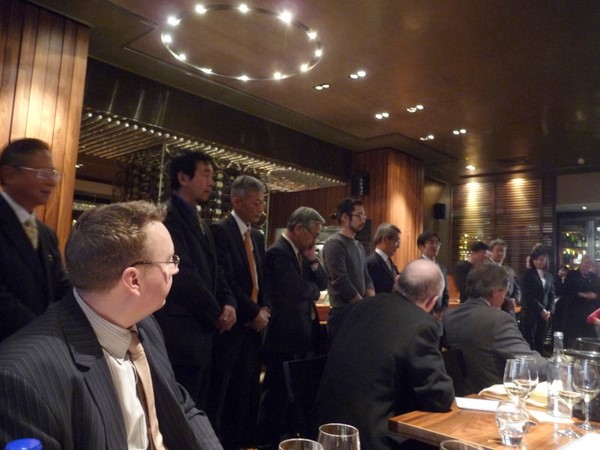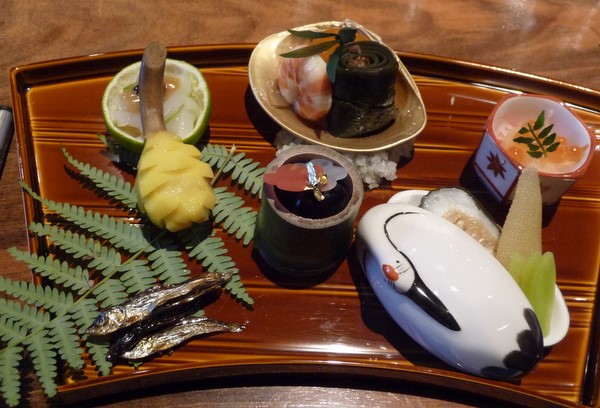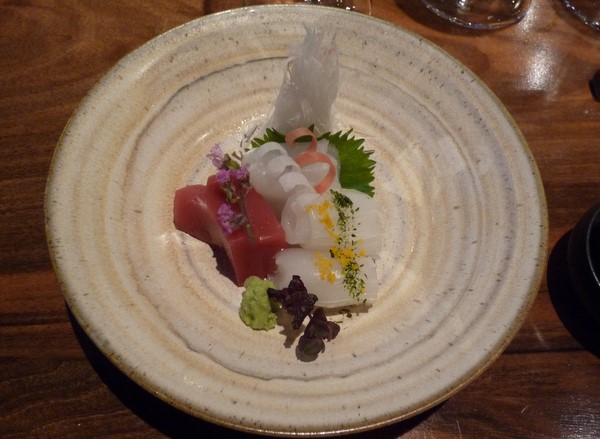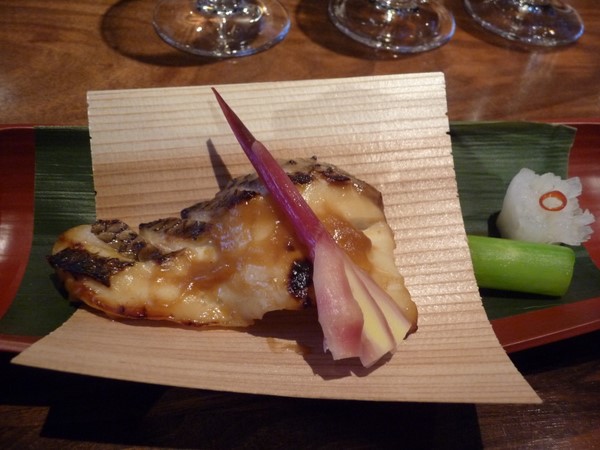|
Koshu
- wines from Japan
Tasting 15 wines from this unique Japanese variety

The Japanese winemakers lining up
at Umu
Website:
www.koshuofjapan.com
If
you are a true lover of wine, then you probably have a curious side.
Iím always interested in trying new things, and so I was delighted
to attend a lunch at Umu (one of Londonís finest, and most
expensive, Japanese restaurants Ė and the first Kyoto-style
restaurant in London when it opened in 2004) hosted by the 15
producers who are part of the Koshu of Japan organization.
Koshu
is a pink-skinned grape variety that has been grown in Japan since
the 8th century. For much of this time it was prized as a table
grape, but since the latter half of the 19th century it has been
used for winemaking.
In
1874 the first Japanese table wines were made, and the first proper
winery was established in 1879 - the Dainippon Wine Company, who had
sent two of their staff to France to learn how to make wine
properly. But it wasn't until the second half of the 20th century
that domestic winemaking in Japan really took off. However, since
the easing of import duties in the 1980s Japanese wine have found it
hard to compete with those from abroad.

On
this plate: black bean, gold leaf; herring egg; baby sardine; prawn
simmered in bonito stock base, shimmered sea kelp, herring; carrot,
radish and white fish; halibut; kinkan citrus; Kuwai water chestnut;
squid, sea cucumber ovary.
The
main Japanese wine region is the Yamanashi Prefecture, some 100 km
west of Tokyo, surrounded by mountains (including Mount Fuji). 40%
of Japanís domestic wine production comes from the regionís 80
wineries (although this may be taking into account wines made from
imported musts), and Yamanashi has 95% of the Koshu plantings in the
country, which total 480 hectares.
Most
of the vineyards are trellised with overhead pergolas, which are
ideal for producing high yields of good looking bunches of grapes,
which is not optimal for wine quality. In 2004, DNA analysis showed
that while Koshu is not actually a Vitis vinifera (the true winemaking grape vine species) variety, it
is most likely an interspecific hybrid with some V. vinifera
in the mix.

Assortment
of raw fish
We
tried 14 different Koshus, and my notes are below. The wines, on the
whole, were bright, fresh and attractive, and a good foil for
Japanese food. Prices (retail) would be £8Ė16 in the UK. A
comment on closures: these wines were all cork sealed, but a high
number of bottles brought to the tasting showed cork taint. If Koshu
wineries insist on using natural cork, they need to screen each
batch and reject those than show evidence of faultiness, because
they are clearly being sent some problematic corks. They should
consider various alternative options, such as Diam, good quality
synthetic corks, or screwcaps, which are taint free.

Grilled
sea bream, miso yuuan
THE
WINES
Grace
Winery Kayagatake 2008
Very bright, fresh and lemony with high acidity, and some subtle
nuttiness. The dominant theme here is fresh lemony fruit. Taut and
intense; a little Chablis-like. 88/100
Lumiere
Koshu Sur Lie 2008
This estate is trying to work organically, and has 2.5 ha of
vineyards. Distinctly mineral and nutty with real precision and high
acidity. Thereís a soy sauce edge to the nose which is savoury and
quite distinctive. 87/100
Alps
Koshu 2008
This winery is trying not to use sulfur dioxide. Nicely fruity
with notes of lemons, nuts and herbs. Itís let down by just a hint
of mustiness in the background. 80/100
Yamanashi
Sol Lucet Koshu 2009 (tank sample)
Distinctive mineralic, lemony nose with a hint of talcum powder.
Very pure, crisp clean palate with nice acidity. 87/100
Sadoya
Koshu 2009 (tank sample)
Just a hint of reduction on the nose. The palate has some
matchstick notes adding minerality to the tight, crisp, fresh
palate. Citrussy and bright but not terribly clean. 82/100
Diamond
Winery Chanter Y, A Amarillo 2008
Nice richness here: lovely fresh, minerally fruit with citrus
pith notes. Very fresh and bright with a fresh spiciness on the
finish. Lovely stuff: very mineral. 90/100
Marufuji
Rubaiyat Koshu Sur Lie 2008
Very focused, clean, pure and taut with nicely mineral fruit and
high acidity. Quite neutral in style, but with some attractive
mineral notes. 88/100
Haramo
Vintage Koshu 2009 (tank sample)
Quite rich with some peachy melon notes as well as fresh bright
fruit. Lovely freshness and minerality but also some attractive
fruit. Very appealing. 90/100
Marquis
Koshu 2009 (tank sample)
Nice pure fruit here with a lovely lemony edge to the fresh but
nicely textured fruit. Precise and well balanced with real
personality, and a hint of sweetness to the fruit. 89/100
Soryu
Koshu Traditional Rich Taste 2008
Very attractive bright focused fruit. Crisp and quite mineral
with nice acidity. 86/100
Katsunuma
Jyozo Arugabranca Isehara 2009 (tank sample)
Very fruity, grassy and bright. Quite Sauvignon-like. Crisp and
expressive with nice purity. 88/100
Yamato
Madoromi 2009 (cask sample)
This is fermented in barriques. Very nice bright, taut lemony
fruit with real precision. Crisp and fresh with good acidity. The
oak merely adds some savoury, spicy notes. 87/100
Shirayuri
LíOrient Barrel Fermented 2008
This spends 6 months in new French oak. Sweet vanilla and
coconut edge to the bright fruit. Very appealing but marked by oak.
85/100
Suntory
Tomi no oka Winery Koshu Special Cuvee Barrel Fermented 2007
This has a distinctive herbal edge with some vanilla notes as
well as fresh fruit. The oak works well: a harmonious wine. 87/100
Wines
tasted as 1/10
Find these wines with wine-searcher.com
Back
to top
|

